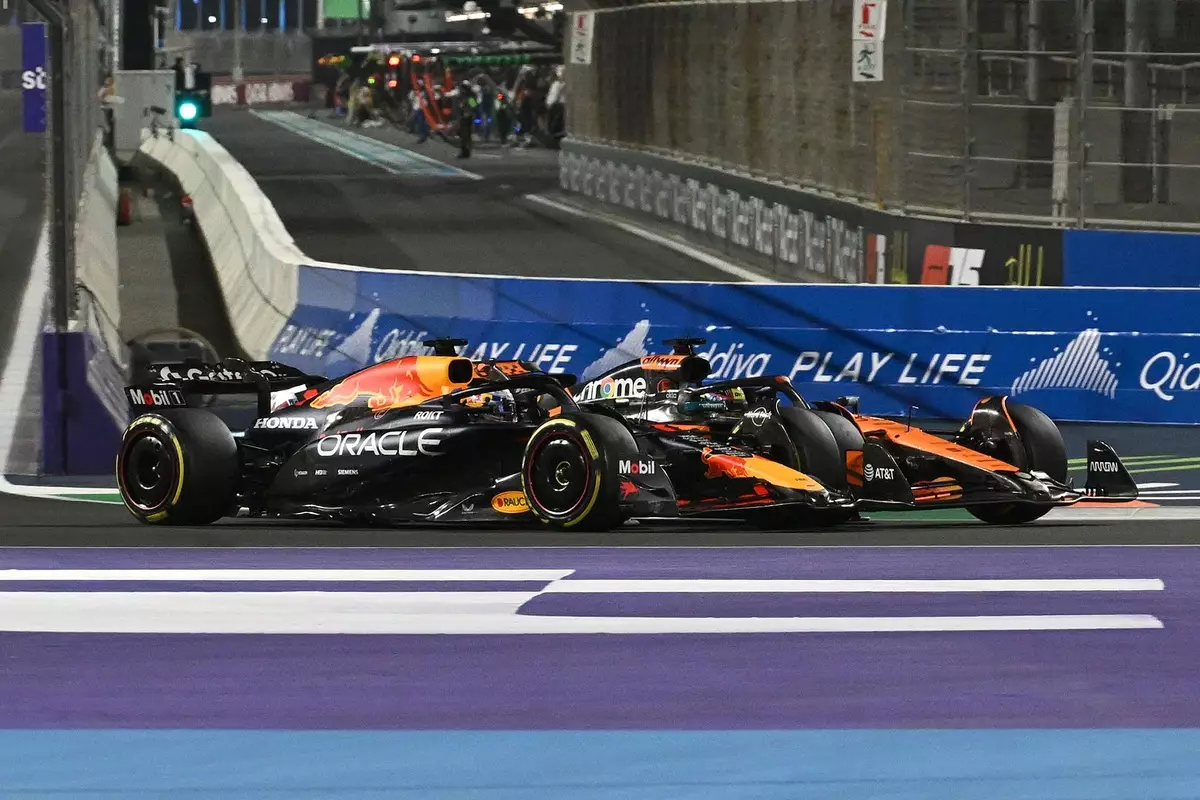In the high-octane realm of Formula 1, where every millisecond counts and victories hinge on split-second decisions, controversies have a way of igniting passionate debates. The recent incident involving Max Verstappen at the Saudi Arabian Grand Prix serves as a quintessential example. Verstappen, the polesitter and reigning world champion, found himself on the wrong side of a five-second penalty after a scrappy start against McLaren’s Oscar Piastri resulted in him leaving the track and allegedly gaining an unfair advantage. The crux of the situation lies not just in the penalty itself but in the broader implications for both Verstappen and the Red Bull Racing team, which ultimately chose not to pursue a right-of-review petition against the decision.
Racing’s Grey Areas: The Incident Explained
During the race, amidst fierce competition, Verstappen and Piastri engaged in a heated duel that culminated in a tactical maneuver going awry. The FIA stewards ruled that Verstappen had gained a significant advantage by venturing off the circuit during their exchange. While Verstappen and his team contended that he was pushed off the track while still claiming the apex position, the stewards delivered a verdict that left the team fuming. Red Bull’s team principal, Christian Horner, expressed their frustration, referring to visual evidence from onboard footage that showcased Verstappen’s driving position, which they believed should have swayed the decision-making process.
This incident throws a spotlight on the often murky waters of racing regulations and how interpretation can vary wildly between teams and governing bodies. The FIA operates under a stringent set of rules; yet, these rules can sometimes lead to outcomes that seem arbitrary from the perspective of the affected teams. The decision-making process is supposed to be grounded in a fair evaluation of the facts at hand, but Verstappen’s case illustrates how subjective interpretations can lead to significant disputes.
The Reluctance to Appeal: A Strategic Move for Red Bull
Despite the emotional turmoil following the penalty, Red Bull Racing opted not to pursue a right-of-review appeal, and this decision warrants careful consideration. One could argue that this choice reflects a deeper understanding of the racing landscape. The team was aware that protesting the stewards’ ruling was likely to yield little more than a reaffirmation of their decision. In an environment where relationships with the FIA are critical, antagonizing the governing body can have long-term ramifications.
Horner’s acknowledgment that launching an appeal would be unlikely to succeed indicates a tacit acceptance of the stewards’ authority. Teams in Formula 1 must carefully weigh their battles; while it can be tempting to fight every perceived injustice, maintaining good relations with race officials is often seen as a more prudent strategy. By stepping back from a contentious protest, Red Bull may be positioning itself for smoother dealings in future races, where the stakes remain incredibly high.
Precedent and the Future: Lessons Learned
Reflecting on past incidents can offer valuable insights. McLaren’s previous unsuccessful right-of-review request following a penalty for Lando Norris in a separate race illustrates the uphill battle teams face when contesting stewards’ decisions. The pattern becomes evident; teams that challenge penalties may find themselves facing an uphill struggle with little hope of overturning a ruling.
The decision not to challenge Verstappen’s penalty underscores an important lesson for the entire paddock—one must choose battles wisely and ensure that the cost of engagement does not eclipse the potential benefits. The world of Formula 1 is undoubtedly thrilling, yet it is also rife with intricacies that require teams to navigate both the technical aspects of racing and the dynamics of race governance with a strategic mindset.
As the season progresses, teams like Red Bull will continue to face similar situations, and how they choose to respond will shape their reputations and standing within the elite world of motorsport. The unfolding drama adds to the rich tapestry of races that define the Formula 1 experience, where high stakes are the norm, and every decision reverberates far beyond the asphalt.

